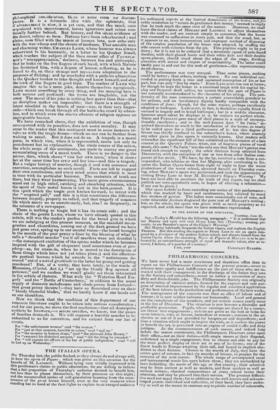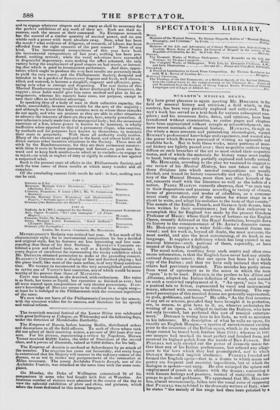PHILHARMONIC CONCERTS.
WE have never had a more wearisome arid thankless office than to report on the Philharmonic Concerts of the present season—never to witness more apathy and indifference on the part of those who are in- trusted with their management, in the discharge of the duties they owe to the Society and subscribers—never to notice a succession of more dirty and discreditable jobs. The Philharmonic Society was originally an association of eminent artists, formed for the express and sole pur- pose of musical improvement by the regular and combined application of the best talents to the production and performance of the best works. The management of the concerts was then an office of labour and of honour ; it is now neither toilsome nor honourable. Loud and general are the complaints of the members, and yet certain names yearly recur in the list of Directors. The situation is now become a desirable and profitable possession. Pupils, whose earnings are shared by a master, are thrust into engagements ; tickets are given as the bait or bribe for some interest, vote, or favour, immediate or remote ; stations in the or- chestra or out of it are provided for hangers-on and dependents; and thus a situation which ought to inspire the wish, as it confers the power to benefit the art, is perverted into an engine of sordid traffic and dirty intrigue. At the commencement of each season, and indeed long before the season commences, the Philharmonic Directors enter upon their office—not on their duties—with ample means at their disposal, unfettered by a single engagement, free to choose and able to pay for the most perfect display of their art in any of its forms; one of the finest bands in Europe awaiting their call, and bound to implicit obe- dience to their decrees. Chosen in the month of July, they have the entire quiet of autumn, in fact six months of leisure, to prepare for the concerts of the next season. The whole range of accompanied vocal and instrumental music lies open before them ; they are unshackled by laws forbidding the music of this age or that country ; their selection may he from ancient as well as modern, and from modern as well as ancient writers; classical compositions of every school invite their attention, and may be pressed into their service. The greatest difficul- ties need not appal them; for in addition to the well.known and acknow- ledged power, individual and collective, of their band, they have autho- rity as well as the means to summon any requisite number of rehearsals, and to engage whatever singers and as many as shall be necessary for the perfect exhibition of any work of their art. Such are their re- sources, such the means at their command. No European monarch has the control of a similar quantity of musical power, and no one wields such a power with more absolute sway. Now, what has been the result ? what evidence of diligence, of research, of labour, has been afforded from the eight concerts of the past season ? None of any kind. The instrumental compositions of this year have been the instrumental compositions of last year ; nothing has been pro- duced, nothing revived ; while the vocal selections have succeeded in disgraceful degeneracy, none making the otter ashamed, the only variety being the employment of good singers on bad music, or entrust- ing that which is good to incompetent performers. And thus, oppor- turties which ought to produce the very best results are perversely made to yield the very worst ; and the Philharmonic Society, designed and intended to be a garden of flowers ever fragrant and fresh, well chosen, tilled, and watered, is become a dunghill, stagnant and offensive, gene- rating only what is corrupt and disgusting. The real duties of this Musical Bumbureaucracy would be better discharged by G000wns, the copyist ; since habit would give him sonic method and plan in his ar- rangements, whereas his masters have none, nor purpose, except to turn their office to individual advantage.
In speaking thus of a body of men in their collective capacity, the whole, unavoidably, become answerable for the acts of the majority ; and although we know that body contains men to whom these remarks do not apply, and who are anxious as they are able in other situations to advance the interests of their art, they are, here, utterly powerless. A new infusion is yearly made into the managerial body ; but the occasional exertions of a few, whose power is known to be transient, is wholly ineffective when opposed to that of a permanent clique, who contrive, by methods and for purposes best known to themselves, to maintain their seats in perpetuity. With them all authority really resides. Many of the electors are employed in the band, and others hold in ad- dition various other lucrative situations in the Society. These men all stick by the Bumbureaucracy, for they are their permanent masters: with them it rests to bestow patronage and favour—to push one for- ward and to keep back another—to admit or to exclude—to engage or to reject—to wink at neglect of duty or rigidly to enforce a law against a suspected rebel.
Such is the present state of affairs in the Philharmonic Society, and such the true cause of those results at which many wonder and all complain. Of the concluding concert little needs be said : in fact, nothing new can be said.
PART I.
Sinfunia in B flat BEETHOVEN. Romance, Madame CINTI DAMOREAU, "Sombre fork"
(Oltiflasme E II) ROSSINI. Concerto, Pianoforte, P minor (MS.), Mr. W. STERNHALE
BENNETT BENNETT. I)uetto, Madame CINTI DA MOREAU and Mademoiselle PLACCI. Serliami ognor si lido" (Seturamide) ROSSINI. Overture (Der Beherrscher der (hider) WEBER.
PART It.
Sinfunia. in A (MS.), composed for the Society ... MENDELSSOHN BARTHOLDr Aria, Signor Ivartorr, "Oh cara iromagiue " (11 Pilau
Magic..) MOZART. Concerto. Violin, Mr. BLAOROVE MAYSEDER.
Scene, Madame CINTI DAMOREAU. " Fatal GotTredo" (nraureo Tasso) PONIZETTI. Overture (Die Zanberflide) MuzAwr.
Leader, Mr. LODER –Conductor, Mr. Maumee.
MENDELSSOHN'S Sinfonia was noticed lust year. It has much of his characteristic style ; for in instrumental composition he has a decided and original style, but its features are less interesting and less com- manding than those of his first Sinfonia. BENNETT'S Concerto ex- hibited a pure and refined taste, as well as a fertile imagination ; in every degree of excellence far transcending the trashy exhibition which Mr. DOEHLER obtained permission to make at the preceding concert. BLAGIIOVE'S Concerto was a display of fine and finished playing ; but
the piece itself, like most of the same author, is of very flimsy construc- tion. We venture to recommend to this very accomplished performer to revive one of Viarres best concertos, any of which would be more worthy of his powers than those of MAYSEDER.
CINTI was welcomed, as she deserved, with enthusiasm. Her voice is as fresh, her tones as liquid, her execution as finished as ever ; but all were wasted upon compositions of very slender pretensions. least- OFT'S knowledge of Mosses. seems to be confined to a single song— at least he is indulged at the Philharmonic with the constant repetition
of the same.
We now take our leave of the Philharmonic Concerts for the season, with the sincerest wishes for its success, and therefore for its speedy and radical reform.



























 Previous page
Previous page